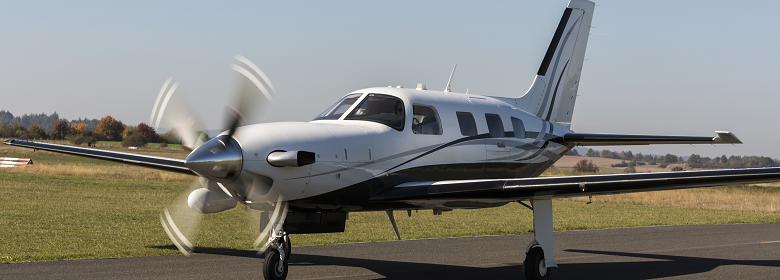
Stock image.
Update: Fort Lauderdale, FL—Jurors Friday afternoon found Daher-Socata and Socata North America were not at fault for the 2014 plane crash that injured a Georgia physician and her husband, the plane's pilot.
The verdict, reached after more than eight hours of deliberations in Florida's 17th Judicial Circuit, cleared the French plane manufacturer and its North American subsidiary on plaintiff's design defect, failure-to-warn, and negligence claims. Attorneys for the couple had sought more than $15 million in damages. McCaleb v. Daher-Socata, CACE15014561.
Cynthia McCaleb, an internal medicine physician, suffered a traumatic brain injury, and her husband, Blaine McCaleb injured his neck and back, when their Socata TBM 700/850 turboprop plane crashed in a Georgia high school athletic field.
The crash occurred after fuel became unported, or sloshed away from the fuel system, while the craft was on autopilot and flying in a sideslip, in which it was oriented at an angle.
The McCalebs contend Daher-Socata and Socata North America, are at fault for designing the plane to use a pumpless, gravity-fed fuel system that allowed fuel to unport in sideslips, and for failing to properly warn owners following a similar wreck more than two years before the McCalebs’ crash.
During Thursday’s closing arguments, the McCalebs’ attorney, Katzman Lampert & Stoll’s Bruce Lampert, suggested jurors award $15 million to Cynthia McCaleb and $800,000 to Blaine McCaleb for the couple’s pain and suffering, among other damages. “Their family has not been able to move on from this crash,” Lampert said.
Whether defective design or pilot error caused the crash served as a central dispute of the three-week trial.
During his closing, Lampert argued that Socata knew of the possibility that the plane could unport its fuel when in an autopilot sideslip, but did not act appropriately to remedy the issue or properly warn pilots of the danger. “Unporting is a 40-year-old problem in the aviation industry, and it’s been fixed by everybody else,” Lampert said, arguing the plane’s yaw damper, designed to avoid dangerous sideslips, did not work properly with the craft’s autopilot. “It’s a latent defect that they didn’t tell anybody about.”
But the defense argued the plane’s gravity-fed fuel system was not defective and the craft was certified by the Federal Aviation Administration. During Thursday’s closing arguments, Nixon Peabody’s Joseph Ortego reminded jurors of evidence that Blaine McCaleb could have engaged the yaw damper himself, and warnings would have indicated the yaw damper was disengaged when he was in autopilot. “This is not a case that another warning, or another indication that the yaw damper was off would make a difference because no more warnings would have made a difference,” Ortego said. “Because he ignored all the others.”
CVN will update this article as events develop.
Email Arlin Crisco at acrisco@cvn.com.
Related Information
The McCalebs are represented by Katzman Lampert & Stoll’s David Katzman, Bradley Stoll, and Bruce Lampert.
Daher-Socata and Socata North America are represented by Nixon Peabody’s Brian Dalrymple, Joseph Ortego, and Erik Goergen and by Akerman LLP’s Michael Marsh and Donnie King.
Not a subscriber?
Learn how you can watch the biggest trials coast-to-coast.





